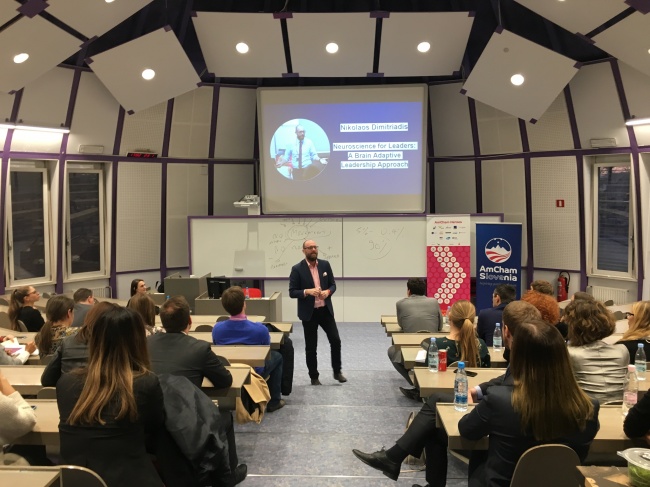
Members of the AmCham Young Leaders Club had the pleasure of listening to dr. Nikolaos Dimitriadis. The Brain Adaptive Leadership Approach, presented in his book “Neuroscience for Leaders”, was created to help managers understand and use the immense power of modern brain sciences in their everyday professional life.
The success of the book shows that people in companies have recognized that a new paradigm of decision-making and action is needed. The old way of thinking in management is not just outdated but dangerous!
Modern science has shown that in order to behave more productively in complex business situations, we need to understand and alter the inner workings of our brain. To paint an extreme analogy a perfect example for that is that the brain is made for moving, so no movement = no brain. Our basic neuro system needs movement. For example, if we are in our offices all day, working on Excel, writing emails etc., then we are not engaged and we are not moving and using our brains for what they were made. Balance does not exist in the brain. We need to decide where to put our energy, our brain partly decides where it is going to put its energy, leaving us only a few percent to decide on for ourselves. Why do we have rational thinking? Our rational part cannot accept a decision, but it can influence the decision-making system.
Our brain has developed two perceptual systems: one driven by our right hemisphere (hereafter, right brain) and the other by the left hemisphere (hereafter, left brain).

Rationality plays a crucial role in decision making, but without the moral compass of emotions and the steady guide of empathy we would just be cold psychopaths.

Dr. Nikolaos Dimitriadis

Our brain is a competitive jungle and in order to operate effectively it needs one of the two systems to be on top.

Dr. Nikolaos Dimitriadis
Rational part of the brain has the ability to travel to the past and back to the future. The illusion is that we think that the cognitive part of the brain makes decisions, but it only has the ability to say no, to say “won’t”.
We have two parts of our brain. Right and left hemisphere. The most important difference though lies in the fact that the right brain appreciates dynamism, complexity, and unpredictability as natural elements of our physical and social environments, while the left brain prefers stability, high controllability, and predictability. The left brain loves its own safe modeling of reality because it creates comfort. At the same time, it hates the real world since the speed with which changes happen is usually too fast for its taste. How can you make safe predictions when you cannot fully grasp all interrelated factors? And how can you ever be in control if you cannot make safe predictions? The left brain strives for ultimate control through sequential/logical explanations while the right brain strives for connectivity through holistic understanding, which is usually beyond words.
Interestingly enough, the left brain is also more arrogant, thinking that it does not need the right brain. Is it by accident that until few decades ago scientists believed that the left brain was much more superior evolutionary than the right and that the left brain was just a leftover of evolution?
If you think that these two systems work, or should work, in harmony think again. Our brain is a competitive jungle and in order to operate effectively it needs one of the two systems to be on top. Currently, the left system looks like the winner.
(1).jpg)
AmCham Heroes:
.jpg)
